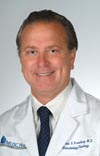|
by Cindy Abole
Public Relations
Charles S. Greenberg, M.D., has devoted his career to developing
programs that improve the lives of patients through his work as both a
basic scientist and clinician. For more than 25 years, he’s focused on
helping patients diagnosed with complications from bleeding problems,
blood clots, and other blood diseases. In March, Greenberg joined MUSC
as a professor of medicine in the Division of Hematology and Oncology
and is working to establish a new Center for Thrombosis and Hemostasis.
 Dr. Charles Greenberg Dr. Charles Greenberg
Prior
to coming to the Lowcountry, Greenberg led a stellar career at Duke
University Medical Center and established its coagulation lab and
program, directed the thrombosis research program and served as
scientific director with the Duke Sickle Cell Center. In each of his
roles, he’s led and motivated others to establish successful programs.
This motivation led him to a move to MUSC to strengthen translational
research and build programs in thrombosis and hemostasis.
“I truly enjoy this work,” said Greenberg, a native of Philadelphia.
“It’s been a wonderful experience working as a hematologist and
scientist helping patients with blood disorders. I’m at a stage in my
career where I want to do more and not less and it led me to MUSC. I
was seeking a new challenge that would allow me to build a clinical
research program that could bring new drugs and treatments for bleeding
and thrombotic disorders and ultimately, improve patient’s lives.”
Greenberg is excited about three things at MUSC: First, is the
opportunity to establish a Center for Thrombosis and Hemostasis and
helping South Carolinians throughout the state. Greenberg, as well as
hospital leadership, is optimistic about meeting the needs in this
specialty care area. He hopes to bring improvements in new drug
therapies for clinical care of all rare bleeding and blood clotting
conditions.
“Blood clots can occur in any organ of the body. With the establishment
of a new thrombosis and hemostasis consult service, we’ll have the
ability to treat all medical and surgical patients,” Greenberg said.
Secondly, he is encouraged by strong leadership in the institution’s
clinical and research missions. He’s previously worked with John
Raymond, M.D., vice president for academic affairs and provost; Jerry
Reves, M.D., vice president and dean, College of Medicine; and Yusuf
Hannun, M.D., Ralph F. Hirschmann Professor and Chair, Department of
Biochemistry and Molecular Biology, all Duke transplants who came to
MUSC.
“They’ve given me the confidence and faith that MUSC will support my career goals,” Greenberg said.
Thirdly, he admires how MUSC supports basic science and translational
research. Greenberg’s research is dedicated to the long-term study of a
blood protein that plays an important role in neurodegeration as in
Alzheimer’s and Huntington’s diseases, tumor growth and chemotherapy
resistance, and desires to ensure that his work can be translated to
drug development. Strong basic science support will help make it more
feasible to make advances in research. “It’s great when you can work
with colleagues who take an interest in your research and collaborate
with you. MUSC’s size and collegial nature of researchers and support
staff makes it easy for researchers to do their work and work with
others who are just as supportive and enthusiastic. It’s a great
environment to conduct basic and clinical research,” Greenberg said.
Within the Department of Medicine, he hopes to collaborate with others
and combine his research knowledge of blood coagulation and proteins to
create drugs that can prevent diseases that cause fibrosis in the
body’s tissues such as diabetes, pulmonary fibrosis, etc. Greenberg’s
work will be made possible via MUSC’s newest construction project, the
six-story Drug Discovery Building. The facility will house chemical and
structural biology laboratories and biotech start-up space for
companies. Next door, the Bioengineering Building will host facilities
for tissue engineering, device development and genomic technologies
research.
Clinically, he’s interested in improving hospital patient safety by
introducing newer, effective therapies and is collaborating with
Patrick J. Cawley, M.D., MUSC hospital executive medical director, and
the medical center’s anti-coagulation management committee.
“This group has done an amazing job providing a safer, quality assured
program to treat patients with heparin, coumadin and other advanced
anticoagulants,” said Greenberg, who has an interest in preventing and
treating complications from heparin therapy.
He’s also anxious to work closely with medical students, residents and
hematology fellows through his hematology consult service, medicine
grand rounds and other opportunities.
Greenberg received his medical degree from Hahnemann Medical College
(now Drexel University School of Medicine) in Philadelphia in 1976. He
completed his internship and residency at the University of Minnesota
followed by a three-year hematology/oncology fellowship at the
University of California at San Francisco and an American Heart
Association Fellowship. In 1983, he was named as director of Duke
University Medical Center’s Coagulation Program and Laboratory and went
on to assume numerous roles until 2009. He holds memberships in the
American Association of Physicians, American Society of Hematology,
American Society of Clinical Research, and the Thrombosis Council of
the American Heart Association. A published author of more than 120
journal articles and book chapters, Greenberg has been an active peer
reviewer of several medical journals, the National Institutes of
Health, American Heart Association and holds several patents derived
from his research.
Friday, Oct. 9, 2009
|



